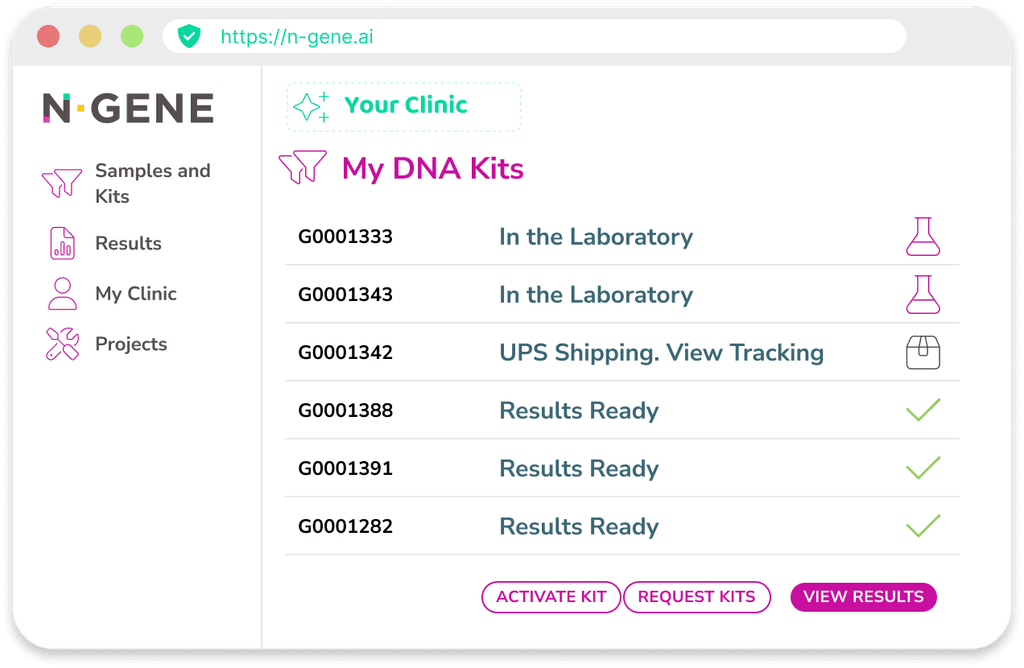The genetic solution for Traumatologists
The genetic solution for Traumatologists
The genetic solution for Traumatologists
Integrate genetics into your practice with N-Gene, the software for trauma professionals that offers personalized solutions to your clients with genetic studies and helps grow your business.
Integrate genetics into your practice with N-Gene, the software for trauma professionals that offers personalized solutions to your clients with genetic studies and helps grow your business.



The most comprehensive
Explore our solutions
The most comprehensive
Explore our solutions
Multiple variants
Explore the predisposition and protection to:
Injuries (soft and bone tissues)
Overload fracture
The stress fracture is related to the bone's ability to withstand repetitive microtraumas, and its genetic predisposition may be influenced by variants in COL1A1, VDR, and LRP5, genes that regulate bone mineral density and bone regeneration capacity. Alterations in these genes can increase the risk of stress fractures, especially in athletes and runners.
Ankle injury
The predisposition to ankle injury, such as recurrent sprains, may be influenced by variants in COL5A1, ELN, and FBN1, genes that regulate the elasticity and stability of ligaments. Mutations in these genes can lead to lower resistance of connective tissue, increasing the risk of joint instability, ligament tears, and prolonged recovery.
Anterior cruciate ligament (ACL) injury
The anterior cruciate ligament injury may be associated with variants in COL1A1, COL5A1, and MMP3, genes involved in collagen formation and ligament tissue strength. These alterations may predispose to lower joint stability, increasing the risk of ACL tear, especially in high impact sports and rapid direction changes.
Achilles tendon injury
The predisposition to Achilles tendon injury may be influenced by variants in COL5A1, MMP3, and TNC, genes that regulate the strength and elasticity of connective tissue. Alterations in these genes can affect the tendon resistance, increasing the risk of tears and tendinopathies due to overload or repetitive impact.
Injuries (soft and bone tissues)
Overload fracture
The stress fracture is related to the bone's ability to withstand repetitive microtraumas, and its genetic predisposition may be influenced by variants in COL1A1, VDR, and LRP5, genes that regulate bone mineral density and bone regeneration capacity. Alterations in these genes can increase the risk of stress fractures, especially in athletes and runners.
Ankle injury
The predisposition to ankle injury, such as recurrent sprains, may be influenced by variants in COL5A1, ELN, and FBN1, genes that regulate the elasticity and stability of ligaments. Mutations in these genes can lead to lower resistance of connective tissue, increasing the risk of joint instability, ligament tears, and prolonged recovery.
Anterior cruciate ligament (ACL) injury
The anterior cruciate ligament injury may be associated with variants in COL1A1, COL5A1, and MMP3, genes involved in collagen formation and ligament tissue strength. These alterations may predispose to lower joint stability, increasing the risk of ACL tear, especially in high impact sports and rapid direction changes.
Achilles tendon injury
The predisposition to Achilles tendon injury may be influenced by variants in COL5A1, MMP3, and TNC, genes that regulate the strength and elasticity of connective tissue. Alterations in these genes can affect the tendon resistance, increasing the risk of tears and tendinopathies due to overload or repetitive impact.
Injuries (soft and bone tissues)
Overload fracture
The stress fracture is related to the bone's ability to withstand repetitive microtraumas, and its genetic predisposition may be influenced by variants in COL1A1, VDR, and LRP5, genes that regulate bone mineral density and bone regeneration capacity. Alterations in these genes can increase the risk of stress fractures, especially in athletes and runners.
Ankle injury
The predisposition to ankle injury, such as recurrent sprains, may be influenced by variants in COL5A1, ELN, and FBN1, genes that regulate the elasticity and stability of ligaments. Mutations in these genes can lead to lower resistance of connective tissue, increasing the risk of joint instability, ligament tears, and prolonged recovery.
Anterior cruciate ligament (ACL) injury
The anterior cruciate ligament injury may be associated with variants in COL1A1, COL5A1, and MMP3, genes involved in collagen formation and ligament tissue strength. These alterations may predispose to lower joint stability, increasing the risk of ACL tear, especially in high impact sports and rapid direction changes.
Achilles tendon injury
The predisposition to Achilles tendon injury may be influenced by variants in COL5A1, MMP3, and TNC, genes that regulate the strength and elasticity of connective tissue. Alterations in these genes can affect the tendon resistance, increasing the risk of tears and tendinopathies due to overload or repetitive impact.
Pain and recovery
Pain and recovery
Pain and recovery
Autoimmune and inflammatory diseases
Autoimmune and inflammatory diseases
Autoimmune and inflammatory diseases
Metabolic degenerative diseases
Metabolic degenerative diseases
Metabolic degenerative diseases
Oncology in Traumatology
Oncology in Traumatology
Oncology in Traumatology
Save time
Save time
Explore genetic data easily
Register your patients
Request kits and pickups
Generate reports in PDF
Receive AI-powered insights
Register your patients
Monitor the progress of your clients' samples efficiently: assign an alias to every sample and track its status instantly

Register your patients
Request kits and pickups
Generate reports in PDF
Receive AI-powered insights

Register your patients
Monitor the progress of your clients' samples efficiently: assign an alias to every sample and track its status instantly
Register your patients
Request kits and pickups
Generate reports in PDF
Receive AI-powered insights

Register your patients
Monitor the progress of your clients' samples efficiently: assign an alias to every sample and track its status instantly
Shall we talk?
Shall we talk?
Shall we talk?
Contact and request a demo with no obligation
Contact and request a demo with no obligation
Contact and request a demo with no obligation
Our experts will provide you with a demonstration of N-GENE and will address all your questions. Discover all the advantages of integrating genetics into your practice.
Our experts will provide you with a demonstration of N-GENE and will address all your questions. Discover all the advantages of integrating genetics into your practice.
Our experts will provide you with a demonstration of N-GENE and will address all your questions. Discover all the advantages of integrating genetics into your practice.
Contact us via WhatsApp

Do You Need to Know More?
Frequently Asked Questions
Frequently Asked Questions
Do I need to be an expert in genetics to interpret the reports?
Do I need to be an expert in genetics to interpret the reports?
Do I need to be an expert in genetics to interpret the reports?
How do I collect the samples from my patients?
How do I collect the samples from my patients?
How do I collect the samples from my patients?
Are the results reliable?
Are the results reliable?
Are the results reliable?
Can this test be used as a diagnosis?
Can this test be used as a diagnosis?
Can this test be used as a diagnosis?
Where do I send the samples and what technology do you use?
Where do I send the samples and what technology do you use?
Where do I send the samples and what technology do you use?
Is it necessary to repeat the test after a few months?
Is it necessary to repeat the test after a few months?
Is it necessary to repeat the test after a few months?
How is the privacy of the samples handled?
How is the privacy of the samples handled?
How is the privacy of the samples handled?
Discover how N-GENE can transform your medical consultation
Discover how N-GENE can transform your medical consultation
Fundamental today, essential tomorrow
The genetic reports from N-GENE are informative and preventive. They do not constitute a medical diagnosis nor do they substitute for individual clinical assessment.
The genetic reports from N-GENE are informative and preventive. They do not constitute a medical diagnosis nor do they substitute for individual clinical assessment.
The genetic reports from N-GENE are informative and preventive. They do not constitute a medical diagnosis nor do they substitute for individual clinical assessment.







